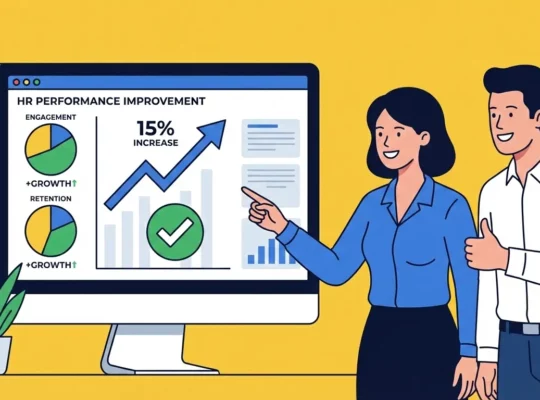Employee tenure is more than just a number on a record. It’s a reflection of experience, loyalty, and a deep understanding of your company’s DNA. This article explores the impact of employee tenure on workplace culture, engagement, and overall success. Whether it’s a seasoned veteran or a recent hire finding their footing, tenure plays a crucial role in shaping a thriving work environment. By delving into the nuances of employee tenure, HR professionals, company leaders, and career development consultants can gain valuable insights to enhance retention, boost engagement, and ultimately, fuel organizational growth.
Table of Contents
I. What is a Tenured Employee?
II. Benefits of Employee Tenure
1. Enhanced Knowledge and Expertise
2. Job Security and Stability
3. Opportunities for Mentorship
4. Improved Employee Loyalty and Commitment
5. Positive Company Culture
III. Challenges of Employee Tenure and How to Face Them
1. Potential Stagnation
2. Limited Career Growth
3. Risk of Burnout
IV. The Role of Tenured Employee Feedback for Company Growth
I. What is a Tenured Employee?
Employee tenure refers to the length of time an employee has been with a company. It’s a valuable metric that goes beyond just job stability. High tenure can indicate a strong company culture, engaged employees, and a commitment to professional growth. By understanding employee tenure patterns, employers can gain valuable insights into retention, identify areas for improvement, and develop targeted strategies to boost job satisfaction and create a thriving workplace.
II. Benefits of Employee Tenure
1. Enhanced Knowledge and Expertise
Accumulation of Institutional Knowledge
A tenured employee brings a wealth of institutional knowledge that is invaluable to a company. This deep understanding of the company’s operations, processes, and history helps create a more cohesive and efficient work environment. This accumulated knowledge can prevent costly mistakes, saving both time and resources.
Reduced Errors and Increased Productivity
With their extensive experience, tenured employees tend to make fewer errors, contributing to higher overall productivity. Their familiarity with systems and workflows allows them to perform tasks more efficiently, often setting the standard for newer team members.
For instance, a seasoned project manager can foresee potential pitfalls and implement preventive measures, thereby enhancing project success rates.
2. Job Security and Stability
Increased Job Security for Tenured Employees
Tenure employees often enjoy greater job security. This stability encourages them to invest more in their roles, leading to higher engagement and loyalty. Employees who feel secure in their jobs are more likely to be motivated and committed, which positively impacts their performance and the overall morale of the workplace.
For example, a long-tenured employee is likely to take on more responsibilities and contribute to strategic decisions, knowing their position is valued and secure.
Benefits to Employers: Lower Turnover Rates and Training Costs
Employers also benefit significantly from long tenure among their workforce. Lower turnover rates mean reduced recruitment and training costs, as retaining experienced employees minimizes the need for constant hiring and onboarding.
Additionally, their stability fosters a more consistent and positive company culture, which is crucial for long-term success. For instance, retaining a highly skilled technician can save the company thousands of dollars in training costs and ensure the continuity of critical operations.
3. Opportunities for Mentorship
Role of Tenured Employees as Mentors
Tenured employees’ deep understanding of the company and extensive experience make them ideal guides for newer employees. By sharing their knowledge and insights, tenured employees help newcomers navigate the complexities of their roles more effectively.
For example, a long-serving sales manager mentoring a new recruit can significantly boost the latter’s confidence and skill set, leading to quicker integration and improved performance.
Positive Impact on New Employee Onboarding and Training
The presence of tenured employees in mentoring roles significantly enhances the onboarding and training processes. This hands-on guidance accelerates the learning curve and helps new employees feel more comfortable and confident in their roles.
The result: efficient onboarding, time-saving, and better productivity. For instance, a seasoned engineer can help a new team member understand complex systems faster than a manual or training module ever could.
4. Improved Employee Loyalty and Commitment
Development of a Loyal Workforce
Long-term commitment to the company sets an example for others, fostering a culture of loyalty and dedication. This loyalty is built on years of shared experiences, achievements, and a deep connection to the organization’s mission.
This creates a powerful form of social proof, fostering loyalty and retention. Witnessing colleagues celebrate milestones like ten-year anniversaries becomes a tangible symbol of the company’s commitment to its employees and their long-term career growth. This, in turn, inspires others to envision themselves building a successful future within the organization.
Higher Employee Engagement and Motivation
Long-term employees tend to exhibit higher levels of engagement and motivation. Their deep-rooted connection to the company and its goals drives them to perform at their best and go above and beyond their regular duties.
This heightened engagement often leads to increased productivity and a proactive approach to problem-solving. For instance, a tenured employee who feels a strong sense of belonging is more likely to take initiative and lead projects that drive organizational success.
5. Positive Company Culture
Stability and Consistency in the Workforce
Tenured employees bring stability and consistency to the workforce. Their continued presence helps maintain a steady rhythm in company operations and ensures that institutional knowledge is preserved and passed down.
This consistency is crucial for maintaining high standards of work and a reliable performance level across the organization. For example, a long-tenured team leader can provide continuity during periods of change, helping to stabilize the team and maintain productivity.
Contribution to a Positive Work Environment
The stability provided by tenured employees significantly contributes to a positive work environment. Their experience and commitment create a supportive atmosphere where employees feel valued and motivated.
This positive environment encourages collaboration, innovation, and a strong sense of community. For instance, a long-term employee who consistently demonstrates a positive attitude and work ethic can inspire others, leading to a more cohesive and harmonious workplace.
III. Challenges of Employee Tenure and How to Face Them
1. Potential Stagnation
Risk of Decreased Motivation and Innovation
Tenured employees, while experienced, may sometimes face the risk of complacency. With years spent in the same role or company, the excitement and drive that once fueled their performance can diminish.
This decline in motivation can lead to a decrease in innovation and productivity, negatively impacting the overall work culture. For example, a long-serving IT professional might stick to familiar solutions instead of exploring new technologies, which can hinder the organization’s growth and adaptability.
Strategies to Keep Tenured Employees Engaged
To counteract complacency, companies must implement strategies and employee engagement programs to keep tenured employees engaged. Regularly introducing new challenges and opportunities can rekindle their interest and drive.
This might include assigning them to cross-functional projects, offering leadership roles in new initiatives, or encouraging them to mentor new employees.
2. Limited Career Growth
Lack of Advancement Opportunities
After many years with a company, opportunities for career advancement might appear limited, leading to dissatisfaction and disengagement. This lack of upward mobility can make employees feel undervalued and stuck in their roles, which can negatively impact their job satisfaction and performance.
Providing Continuous Learning and Development is Key
To mitigate the risk of perceived stagnation, companies should focus on providing continuous learning and development opportunities. Offering access to advanced training programs, workshops, and certifications can help employees enhance their skills and feel more valued. This approach not only boosts their confidence but also prepares them for potential career advancement within the company.
3. Risk of Burnout
Long Tenure Leading to Job Fatigue
Long tenure can sometimes lead to job fatigue and burnout. Performing similar tasks over an extended period can become monotonous, draining the employee’s energy and enthusiasm.
This burnout can result in reduced productivity, increased absenteeism, and a decline in overall well-being.
Measures to Maintain Employee Well-being
Preventing burnout involves proactive measures to ensure the well-being of tenured employees. Companies should promote a healthy work-life balance by offering flexible work schedules, encouraging regular breaks, and providing mental health support.
Additionally, rotating employees through different roles or departments can offer variety and reduce monotony.
IV. The Role of Tenured Employee Feedback for Company Growth
Tenured Employee Reviews: A Goldmine of Insights
Experienced employees offer a wealth of knowledge about your company, its strengths, and areas for improvement. Their feedback is crucial for:
- Identifying opportunities: Tenured employees can highlight inefficiencies or suggest improvements based on their experience.
- Boosting innovation: Their deep understanding of the company’s history and culture helps them propose impactful solutions.
- Fostering a positive work environment: Actively seeking their input shows they are valued, leading to increased engagement and morale.
Leveraging Tenured Employee Feedback With Review.jobs
Overview of Review.jobs – An Employee Review Management Platform
Review.jobs is a certified employee review management platform designed to help companies gather, analyze, and act on feedback from their workforce. By providing a centralized system for collecting reviews, Review.jobs enables organizations to gain valuable insights into employee engagement, job satisfaction, and overall workplace culture. This platform supports businesses in creating a positive and productive work environment by ensuring that every voice is heard.
Review.jobs Features: The Golden 4 Steps
Using Review.jobs offers several key benefits for companies looking to harness the power of employee feedback:
- Centralized Feedback Collection: All employee reviews are gathered in one place, making it easy to track and analyze trends over time. This centralized approach ensures that no feedback is lost and that all insights are considered.
- Actionable Insights: The platform’s advanced analytics tools help translate raw feedback into actionable insights. Companies can identify patterns, pinpoint areas for improvement, and develop targeted strategies to enhance employee engagement and job satisfaction.
- Enhanced Communication: Review.jobs facilitates open communication between management and staff, fostering a culture of transparency and trust. Employees feel more comfortable sharing their thoughts, knowing that their feedback will be taken seriously and acted upon.
- Improved Decision-Making: By leveraging detailed feedback data, companies can make informed decisions that align with their organizational goals. Whether it’s refining employee engagement initiatives or addressing specific workplace issues, Review.jobs provides the insights needed to drive effective change.
Tenured employees are a goldmine of experience, but can also present challenges. The key is to leverage their expertise! By actively seeking their insights, companies can spark innovation and stability. Review.jobs offers a powerful platform for managing this feedback, enabling companies to enhance employee engagement and strengthen their employer image. Balance this with fostering a culture of continuous learning for all, and you’ll have a recipe for a thriving workplace that retains top talent and fuels long-term success.





